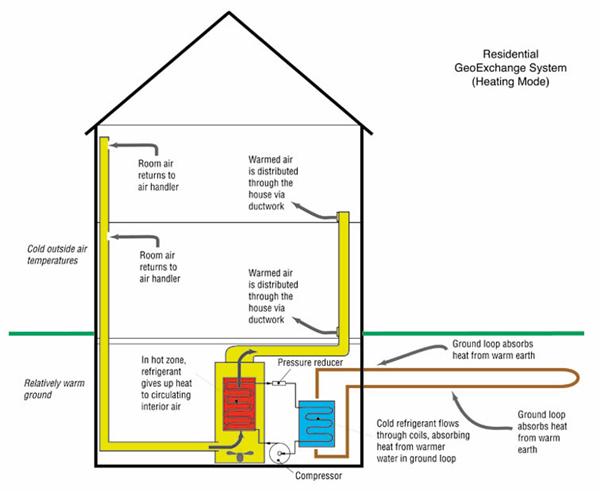With the rising cost of traditional energy sources, as well as the need to find sustainable ways to reduce greenhouse gases, geothermal residential heating provides an import and efficient source of heating.
Using the sample centralized heating system integrated into many homes, heat pumps are a natural, Energy Star certified way to provide heat transfer from the ground. The result is that households can save over 1/3 off of traditional energy bills, while also being able to reduce emissions, noises and overall energy costs throughout one’s home.
Since soil temperatures are relatively stable when compared to varying above-surface temperatures, and so energy transfer from the ground can provide a source of heat energy. Depending on the geographic location, most soil temperatures vary around 50 degrees, which provides an important source of heat and energy for a variety of households. Many homes in North American and Europe have installed systems which conduct energy from the ground through geothermal heat pumps. With an increased focus on sustainable low-carbon energy production, many governments and organizations have issued tax rebate incentives to encourage adoption of geothermal systems.
Ground-source heat pumps transfer the energy by way of a refrigerant, which allows for heating of households at a high level of efficiency. The refrigerant solution then transfers the extracted heat to circulate throughout homes, which provides an important source of natural heating for a wide variety of households today. Major utility companies are now offering installation and incentive of the latest heat pumps as an effort to provide more affordable residential heating options, while the EPA (Environmental Protection Agency) is actively working to promote adoption through its Energy Star program.
Scientists have further improved the technology which was first developed in the 1940s, and has undergone continued development over the past few decades. New materials such as polybutylene were developed in order to improve conductivity of the systems, and there are over 100,000 heat pumps installed world-wide. The latest technology relies upon advanced conductivity to further increase efficient energy transfer during the winter. Since the systems have a high level of stable efficiency, they are particularly useful in cold Northern winter climates. With improvements in efficiency, the systems are even more economically sustainable than before, resulting in more widespread adoption among households.
With the recent Federal stimulus package, government incentives for installation were increased, and development of green jobs for certified installers is also being encouraged. As a proven technology that provides an important source of green energy, geothermal heating is a great way to hedge costs for heating oil, which is growing in demand with a limited supply.
Communities throughout the world, from the Northwestern United States to Europe are rapidly adopting the technology as a means to increase global sustainable energy sources. Residential heating bills can decline by as much as 50% with a properly installed system, allowing for consumers to benefit during difficult economic times. The ability of households to dually benefit from lower costs, more environmentally friendly practices and tax incentives has made geothermal residential heating a solution on the rise.
Using geothermal residential heating can save you money, Contact us today.

